|
|
THE FIELD GENERALS
by William Marvel
UNION
GEORGE BRINTON MCCLELLAN, 1826-1885. A top West Point graduate and a
promising staff officer before the war, McClellan had spent a few years
as a railroad executive before winning prominence in an early campaign
in western Virginia. This led President Lincoln to appoint him commander
of the army that had been defeated at First Bull Run, and later he put
McClellan in charge of all Union forces.
McClellan moved his army slowly up the York River peninsula toward
Richmond after much prodding from the government, but he was sent
reeling back to the James River in a week of almost continuous fighting.
Afterward he stopped the Confederate invasion of Maryland, but failed to
demolish the much smaller Southern army at the battle of Antietam.
A brilliant administrator, he instilled in the Army of the Potomac an
esprit de corps that survived his battlefield defeats. McClellan proved
insufficiently bold before the enemy, moving slowly and failing to
strike aggressively when the occasion called for it, For that Lincoln
removed him after the battle of Antietam. McClellan also harbored
political objectives hostile to those of the Lincoln administration, and
in the 1864 election he stood unsuccessfully as the Democratic candidate
for president.
GEORGE GORDON MEADE, 1815-1872. Born in Cadiz, Spain, where his
father was a diplomat, Meade entered West Point at the age of sixteen
and graduated in 1835. A year later he resigned to become an engineer,
but he was reappointed in 1842 and served in the Mexican War. He
remained in the army as an engineer until the outbreak of the Civil War,
when he was given his first field command as a brigadier general of
volunteer infantry. Wounded during the Seven Days in 1862, he led a
division at Antietam and rose to corps command after Fredericksburg.
Two days before the battle of Gettysburg Meade was assigned to
command the Army of the Potomac, which he led ably enough through that
battle, but he was criticized for his failure to capture the entire
Confederate army. He continued in command until the end of the war, but
from the spring of 1864 he was reduced to little more than a figurehead
because the general-in-chief, Grant, traveled with that army. A gruff,
disagreeable man with a violent temper, Meade argued with nearly all his
chief subordinates at one time or another.
ULYSSES SIMPSON GRANT 1822-1885. Grant enjoyed the greatest success
story of the entire Civil War. After graduating in the bottom half of
the West Point class of 1843, he served under both Zachary Taylor and
Winfield Scott during the Mexican War, but the peacetime army left him
lonely and bored. He turned to the bottle for solace and finally
resigned as a captain in 1854. He failed even more miserably in civilian
life and was virtually subsisting on the charity of his family when the
Civil War erupted.
Again showing the stubborn determination that served him so well,
he hammered the enemy mercilessly, launching coordinated offensives in
all theaters of the war.
|
First given command of an Illinois regiment, Grant was soon appointed
brigadier general. He achieved some notoriety with an attack on Belmont,
Missouri, in November of 1861, but real fame came the next February,
when he captured an entire Confederate army at Fort Donelson, Tennessee.
His failure to take adequate precautions at Shiloh led to a surprise
attack that nearly drove his army into the Tennessee River, but his
stubbornness saved the day and reversed the tide of battle.
With the capture of Vicksburg Grant gained command of all Union
forces in the western theater, and his spectacular victory at
Chattanooga led Congress to approve his appointment as lieutenant
general and general-in-chief of all Federal armies. Again showing the
stubborn determination that served him so well, he hammered the enemy
mercilessly, launching coordinated offensives in all theaters of the
war. Lee's surrender at Appomattox was the acme of Grant's career, which
was later tarnished by an embarrassing foray into politics, where his
simple principles of courage and determination proved ineffective
against special interests and greed.
WILLIAM TECUMSEH SHERMAN, 1820-1891. Sherman graduated near the top
of the class of 1840 at West Point. He spent the Mexican War in
California, where there was little armed conflict, and he resigned in
1853 to become a banker there. In 1857 he returned to Ohio and gained
admission to the bar, but that career displeased him and he sought
reappointment in the army. Instead he found employment at a military
school in Louisiana, resigning as superintendent two years later, when
war broke out.
Given a Regular Army commission as colonel, Sherman led a brigade at
First Bull Run, then took command of Union forces in Kentucky as a
brigadier general. There he ran afoul of hostile newspapers that throve
on his controversial remarks about the conduct of the war, and he
hovered on the brink of a nervous breakdown when he was relieved. His
career was saved by assignment to the army of Ulysses Grant: the two
worked together successfully for the next two years, and when Grant took
the top command he left Sherman in charge in the West.
Sherman waged war on all fronts, striking not only at the South's
armies but at its economy and its will to resist.
|
Sherman waged war on all fronts, striking not only at the South's
armies but at its economy and its will to resist, and his devastating
March to the Sea marked the advent of modern warfare. He proved as
magnanimous in peace as he had been relentless in war, however, and the
surrender terms he first offered to Joseph Johnston's Confederate army
were so generous that the government refused to honor them.
PHILIP HENRY SHERIDAN, 1831(?)-1888. Appointed to West Point in 1848,
Sheridan was dismissed for attacking a cadet sergeant, but he was
reappointed and graduated well down on the list in 1853. He served
inconspicuously in the peacetime army and was still a lieutenant when
the war began. For another year he remained at company rank, performing
quartermaster service in the western theater, but in May of 1862 he was
finally given command of an infantry regiment.
From there Sheridan rose meteorically to command of a brigade,
earning a general's star in July and taking command of a division in
September. He fought well at Perryville, Stones River, and Chickamauga.
Grant noticed his performance at Chattanooga, where Sheridan's division
stormed Missionary Ridge and chased the enemy into Georgia, and the
following spring Grant chose the diminutive Irishman to command the
cavalry of the Army of the Potomac.
Sheridan's troops killed General J. F. B. Stuart in their first raid
that year, and in August he was given command of the Union army in the
Shenandoah Valley. There he trounced a smaller Confederate army at
Winchester and Cedar Creek, and early in 1865 he scattered the remnants
of that force at Waynesboro. Grant gave Sheridan effective command of a
large portion of the Army of the Potomac at Five Forks, and Sheridan led
one wing of the pursuit to Appomattox. A feisty, egotistical, and
ambitious little fellow, once Sheridan tasted success he seemed
unwilling to let anything stand in his way.
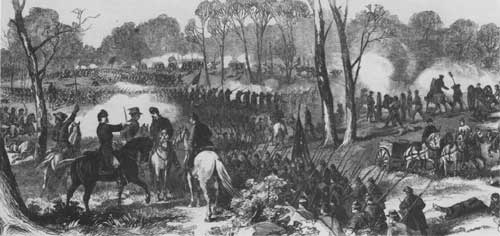
|
THE BATTLE OF PEA RIDGE (LC)
|
CONFEDERATE
JOSEPH EGGLESTON JOHNSTON, 1807-1891. Johnston attended West Point
with both Jefferson Davis and Robert F. Lee, graduating with Lee in
1829. He was wounded in every war that he fought, starting with the
Seminole War, and in Mexico he was shot five different times. He served
as an engineer in peacetime until 1855, when he was assigned to a
mounted regiment as lieutenant colonel. In that capacity he served
through the Kansas troubles and the Mormon expedition, but in the summer
of 1860 he was appointed quartermaster general of the U.S. Army.
Johnston resigned that post ten months later, taking command of
Confederate troops at Harpers Ferry. His little army arrived in time to
help win the first battle at Manassas, after which Johnston was promoted
to full general and given command of the troops in northern Virginia.
Taking his army south to defend Richmond, Johnston was severely wounded
at the battle of Seven Pines, and he remained inactive until given
nominal command over all troops between the Tennessee and Mississippi
Rivers.
This frustrating assignment was marked by repeated failures, largely
because President Davis overruled Johnston, but at the end of 1863
Johnston was given direct command of the shattered Army of Tennessee.
Davis grew annoyed when Johnston met Sherman's advance on Atlanta with
defensive strategies, and late in July he replaced him with the more
aggressive John Bell Hood. Johnston again assumed command of what
remained of that army in February of 1865, jousting ineffectually with
Sherman's much larger army until he was forced to surrender on April 26.
Johnston was one of few senior Confederates who realized that offensive
tactics would drain limited Southern manpower, and his foresight led to
constant friction between him and President Davis.
ROBERT E. LEE, 1807-1870. The son of a renowned Revolutionary War
soldier, Lee took second place in the West Point class of 1829,
graduating without having accumulated a single demerit. Serving as an
engineer for most of his career, he was one of Winfield Scott's most
trusted staff officers during the Mexican War. He was superintendent of
the military academy for three years, after which he was appointed
colonel of a cavalry regiment on the frontier, but he spent much of that
assignment on leave of absence. He commanded a detachment of U.S.
Marines and stray soldiers who stormed John Brown's bastion at Harpers
Ferry in 1859, and he had just returned to his cavalry regiment in Texas
when secessionist troops forced him to return east.
Named one of the five original full Confederate generals, Lee served
a few dismal months in western Virginia and on the coast of South
Carolina before taking command of the Army of Northern Virginia on June
1, 1862. His three years at the head of that army made him a legend as
he first drove the Federals from the gates of Richmond, pushed them back
into northern Virginia, and twice invaded the North.
In the end many of his soldiers seemed to cling to the army out of
personal loyalty to the general himself.
|
Lee's boldness and sheer luck nearly brought the European recognition
that might have saved the Confederacy, but his aggression also cost
heavy casualties that the South could ill afford, and in the final year
of the war he was forced to follow a defensive strategy, though he still
attacked ferociously now and then within the confines of that strategy.
In the end many of his soldiers seemed to cling to the army out of
personal loyalty to the general himself.
THOMAS JONATHAN JACKSON, 1824-1863. Though he never commanded a large
independent army, "Stonewall" Jackson is far more famous than most of
those who did. A graduate of the West Point class of 1846, he served
with distinction as an artilleryman in Mexico, resigning in 1851 to
teach at Virginia Military Institute. Unimpressive as a professor there,
he was often ridiculed by the cadets, who were puzzled at his personal
idiosyncrasies.
Appointed a Confederate brigadier general in June of 1861, Jackson
led a brigade at First Bull Run that stemmed a Union onslaught and put
the enemy to his heels. There he earned his nickname and a slight wound
to the hand. The following spring, with about 10,000 men, he began a
campaign against three Union armies in the Shenandoah Valley, defeating
them all at one time or another by virtue of rapid movements and
surprise attacks; his maneuvering tied up some 70,000 Federals who might
otherwise have taken part in the movement against Richmond. Afterward he
served with Robert E. Lee in the Army of Northern Virginia.
He inspired his men with repeated successes rather than with his
person presence or attention, and his name came to strike terror in the
hearts of Union soldiers.
|
During the Seven Days Jackson put in a lackluster performance, but at
Second Bull Run he shone again, holding against the more powerful Union
army until the rest of Lee's troops could execute a decisive flank
movement. He captured Harpers Ferry and 12,000 Federal soldiers during
the Maryland campaign and staved off superior forces at Fredericksburg,
but his greatest battle was Chancellorsville, where he led a wide
flanking movement that crumbled the flank of the overwhelming Union
army. There Jackson was mortally wounded, though, and he died eight days
later. Laconic, dyspeptic, and secretive, Jackson was unsympathetic to
his enemy and his troops alike. He inspired his men with repeated
successes rather than with his personal presence or attention, and his
name came to strike terror in the hearts of Union soldiers.
BRAXTON BRAGG, 1817-1876. After graduating near the top of the class
of 1837 at West Point, Bragg spent nine teen years on active duty. As an
artillery officer he fought in the Seminole War and in Mexico, most
notably at the battle of Buena Vista, where his battery helped repel a
key Mexican attack. After the war his battery was assigned to New
Mexico, but Bragg served instead on staff duty. He finally resigned in
1856 to manage a plantation in Louisiana, but he was appointed a
brigadier general in the Confederate army five weeks before the Civil
War began.
Bragg commanded a wing of the army at Shiloh, and late in June of
1862 he took command of the Army of Tennessee, which he retained for
seventeen unfortunate months. During a poorly coordinated invasion of
Kentucky that autumn, Bragg missed an opportunity to fight the enemy on
his own terms, and eventually he was forced to abandon everything he had
gained. At Stones River he surprised the stronger Federals but failed to
crush them, despite enormous casualties on both sides. His only real
victory came at Chickamauga, but he was unable to break down the Union
rear guard and scatter the retreating foe. His humiliating defeat at
Chattanooga two months later led to his promotion to military adviser
for President Davis.
Though extremely argumentative with subordinates and equals, Bragg
got along well with Davis, and he served the Confederacy far better in
this administrative capacity than he ever had on the battlefield. Toward
the end of the war he accepted another field command, taking a corps in
the army he had once led, and with that he participated in the final
defeats in North Carolina.
JOHN BELL HOOD, 1831-1879. A contemporary of Philip Sheridan, Hood
graduated near the bottom of his class at West Point in 1853, He fought
Indians as an infantryman until he resigned from the army in April of
1861.
Though a Kentuckian himself, early in 1862 Hood took command of a
Texas brigade, with which he broke the Union line at Gaines's Mill,
during the Seven Days' battles. He led this brigade at Second Bull Run
and Antietam, after which he was given a division. At Gettysburg he
suffered a wound that crippled his left arm, but ten weeks later he
returned to the front at Chickamauga, where he lost his right leg.
The wound would have put a less combative man out of the war, and it
might have been better for the Confederacy if Hood had retired, but when
the Atlanta campaign began, early in May, he took his place at the head
of a corps, though he had to be strapped into the saddle. Preferring the
offensive despite dwindling Confederate resources, Hood criticized
Joseph Johnston's more cautious strategy, and the equally aggressive
President Davis finally displaced Johnston in favor of Hood on July 17.
In three days of fruitless hammering at the advancing Federals Hood lost
more men than Johnston had during the entire campaign. Finally Hood
allowed Sherman's army to encircle Atlanta completely, and Hood
responded by swinging back on Sherman's line of communications, which
allowed Sherman to proceed virtually unmolested across Georgia.
Doubling back to Tennessee, Hood sacrificed one-sixth of his army and
his best division commander in an unsuccessful effort to eliminate part
of the Union army at Franklin, and two weeks later his army was
virtually destroyed at Nashville. In January of 1865 he asked to be
relieved of command, which essentially ended his Confederate career.
|
It was often overlooked even at the time that all the while the Union
waged its war to rebuild itself, it was also pushing its borders further
west, admitting new states, beginning the preliminaries that led to the
first transcontinental railroad, and after 1863 creating the land grant
colleges that later became many of the nation's great state
universities. Lincoln also conducted a remarkably successful foreign
policy, aimed chiefly at keeping other nations out of the war, helped
bring about a small social revolution by the enlistment of free Negroes
into black regiments, and brought about substantial changes in the
nation's economy, including the not exactly popular institution of the
first income tax. By 1864 the war was costing $4 million a day, a
staggering expense undreamed of before 1861, and a reflection not only
of the magnitude of the war itself but also of the national expansion
and organization that took place during the conflict. The Union was on
its way from being a major power in its hemisphere to becoming a major
power on the globe. Almost literally, Lincoln fought the Confederacy
with one hand while he oversaw the transformation of the United States
with the other.

|
MEN OF COMPANY E. 4TH U.S COLORED INFANTRY AT FORT LINCOLN. (LC)
|
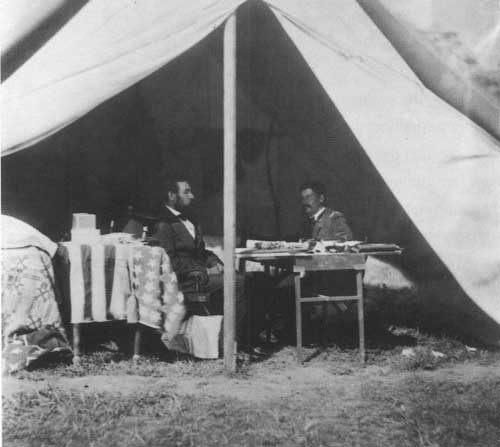
|
THE PRESIDENT CONFERS WITH GENERAL GEORGE B. MCCLELLAN. (LC)
|
By the end of 1862, events in the war in the eastern theater might
have suggested that Lincoln use both hands for his war, for the story of
defeat that began the war at Fort Sumter and Bull Run continued almost
without letup. Following the retreat of his army to Washington, Lincoln
brought a new man to its command, McClellan, who had made a name for
himself with some very minor successes in western Virginia. "Little
Mac," as his men affectionately called him, had the gift of inspiration
and proved to be perhaps the finest organizer of the war. He rebuilt the
demoralized army, soon to be called the Army of the Potomac. He selected
officers almost as inspiring as himself, gave the men renewed pride in
themselves, equipped them magnificently, drilled them to a degree
unheard-of among volunteer troops, and in all turned them into the most
impressive military body ever seen on the continent by early 1862.
Fortunately, the war stayed quiet in Virginia for months after Bull Run,
giving him time to do all this, but as the spring of 1862 approached,
Lincoln and the Union expected McClellan to use this wonderful army.
McClellan's plan looked brilliant when presented. He wanted to put
his army aboard transports and steam down the Potomac to Chesapeake Bay,
then south to Fort Monroe, a massive fortification at the tip of the
Virginia peninsula formed by the James and York Rivers. Monroe was too
strong for the Confederates to drive its Union garrison out, and so it
sat like a knife poised at the back of Richmond. McClellan would use it
as his base, land his troops, and march up the Peninsula to attack and
take Richmond from the rear. If he moved quickly, he could end the war
in the East in a few weeks.
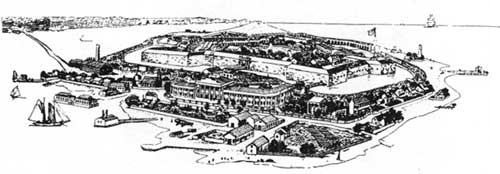
|
FORT MONROE (BL)
|
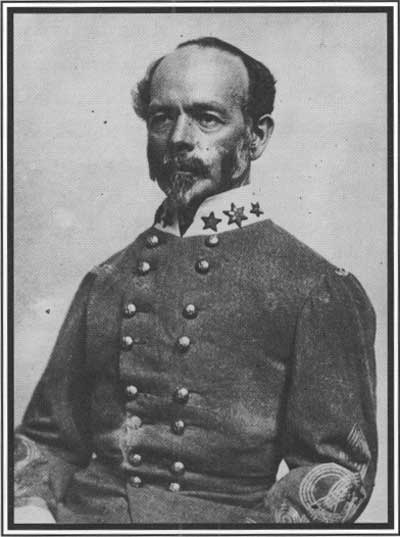
|
GENERAL JOSEPH E. JOHNSTON (LC)
|
It all went wonderfully until McClellan landed. Then he showed the
other side of his generalship—timidity, a tendency to exaggerate
the size of the enemy before him, and a dread fear of responsibility in
case of defeat. Opposed to him at first were only a few thousand
Confederates at Yorktown. With more than 60,000 men ashore and more
coming every day, McClellan could have walked over them. Instead, he
stopped to prepare a siege. That gave Confederates time for the rest of
their army, commanded by Johnston, to come to the scene. In the end
Johnston would still have no more than 60,000 men while McClellan
commanded more than 100,000. But throughout the campaign that followed,
instead of moving quickly and taking advantage of his superiority,
Little Mac stalled, stumbled, and consistently believed that the Rebels
outnumbered him.
In fact, throughout April and most of May, McClellan advanced only
because the equally timid and fearful Johnston pulled back before him
without a fight. Not until May 31 did they finally meet in real battle
at Seven Pines, where Johnston took a serious wound that put him out of
the war for months. President Davis gave the command to Robert E. Lee,
his chief military adviser, and now the Confederates had a commander
worthy of their valor. Thereafter Lee completely dominated the campaign.
Stonewall Jackson had just finished an electrifying campaign a hundred
miles to the west in the Shenandoah Valley, where his small force had
decisively met and defeated three separate Federal forces and driven
them from the Valley and its vital agricultural resources. Lee now
summoned him to Richmond, and together they struck at McClellan on June
25, commencing what were called the Seven Days' Battles. Day after day
until July 1 Lee struck, and while he never obtained the decisive
victory he sought, still he so overwhelmed McClellan that the Federals
finally pulled back toward Fort Monroe and eventually withdrew entirely
without offering battle again.
Little Mac's reputation was severely tarnished, but Lee's rose to the
forefront, and through the balance of the year he polished it the
brighter. While McClellan stumbled on the Peninsula, Washington built
another command called the Army of Virginia, designed to protect it
while McClellan's army was away. In late July its commander, General
John Pope, led it south in the hope of drawing Lee away from Richmond to
allow Little Mac to advance once more. But Lee knew that McClellan would
not budge and sent Jackson to stop Pope. At Cedar Mountain on August 9
Jackson struck a devastating blow that turned back one of Pope's corps,
and then Lee, seeing that McClellan was starting to abandon the
Peninsula, took the balance of his army to reinforce Stonewall. On
August 28-30, along the banks of Bull Run and on some of the same ground
where the battle of the year before had been fought, Lee and Jackson
soundly defeated Pope, though this time the Federals did not run in
demoralization. Nevertheless, the sting of these defeats following hard
or one another badly humiliated McClellan—who withheld much-needed
support from Pope, ruined Pope himself, and stunned the North.

|
LIEUTENANT GENERAL ROBERT E. LEE (USAMHI)
|
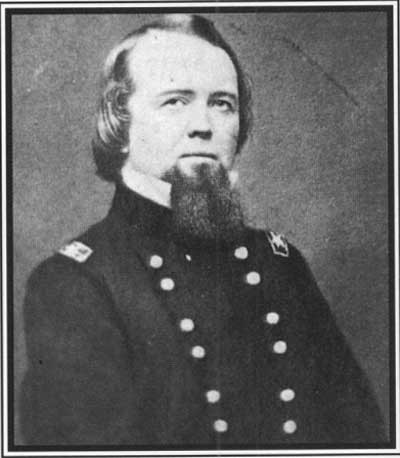
|
BRIG. GEN. JOHN POPE (CWL)
|
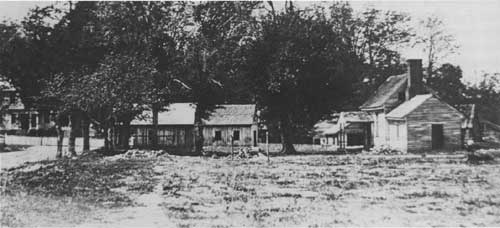
|
MECHANICSVILLE, VIRGINIA, SITE WHERE THE SEVEN DAYS' BATTLES BEGAN.
(CWL)
|
Lee and Davis sensed that this was the perfect time to launch an
invasion of the Union, It would further disorganize Yankee morale and
give northern Virginia some relief from the exhausting presence of the
armies. He led his newly designated Army of Northern Virginia across the
Potomac in early September and drove into Maryland. McClellan, by now at
nearby Frederick, encountered a monumental stroke of luck when a copy of
Lee's plan of campaign fell into his hands, but he moved slowly to
capitalize on it, and the two armies did not meet each other until
September 17. Still, Little Mac caught Lee at a disadvantage, with much
of his army several miles distant and the remainder backed up against
the Potomac near Antietam Creek. Fortunately for the Confederates,
McClellan conducted a miserable battle, wasting time, making piecemeal
attacks with parts of his army instead of taking advantage of its
numerical superiority. In the end, after what proved to be the bloodiest
day of the whole war, with almost 5,000 killed between the two armies,
the balance of Lee's army arrived in the last moment and he held his
ground rather than be pushed back into the river. Typically, Lee wanted
to fight again the next day, but McClellan had no stomach for it, and
Lee, who was still in a very precarious position, had no choice but to
retire to Virginia.
Because the Federals held the field and Lee retreated, the Union
claimed Antietam as a victory, though if anyone should be counted the
victor it was Lee for saving his army from such a dangerous position.
Still, it was Lincoln's first success in the East, and he used it as the
pretext for his Preliminary Emancipation Proclamation. But it would be
McClellan's last battle. Fed up with the general's sloth and
haughtiness, Lincoln replaced him on November 7 with General Ambrose
Burnside. This handsome and well-liked officer would last through only
one battle as a commander before he, like McClellan, learned just how
formidable Lee and his army could be. Burnside advanced into Virginia
toward Fredericksburg, on the Rappahannock River, barely fifty miles
from Richmond, and there planned to cross and move on the Rebel capital.
Lee was waiting for him, well entrenched on the southern side of the
river, and when Burnside attacked on December 13, the Confederates
summarily stopped his campaign. Delays in getting the pontoon bridges
that he needed to cross the river lost Burnside valuable time, and when
he did get his bridges erected—under fire—and his men across
the river, Lee pinned them down in the streets of the city or met them
with withering fire as they attacked up a slope. In the end, after
suffering more than 12,000 casualties, Burnside gave up.
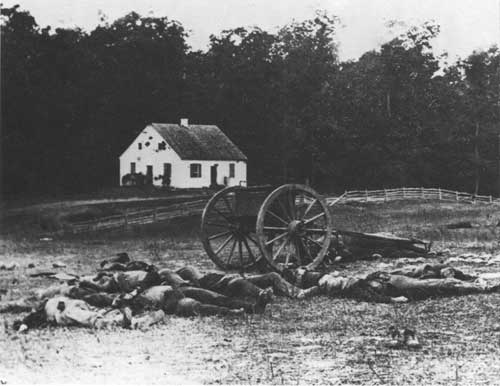
|
DEAD SOLDIERS OUTSIDE DUNKER CHURCH AFTER THE BATTLE OF ANTIETAM. (LC)
|
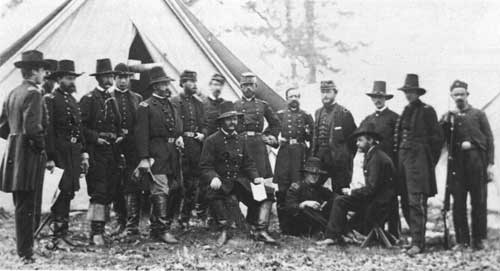
|
GENERAL AMBROSE BURNSIDE (SEATED, CENTER) AND STAFF PICTURED AT ARMY OF
THE POTOMAC HEADQUARTERS. (CWL)
|
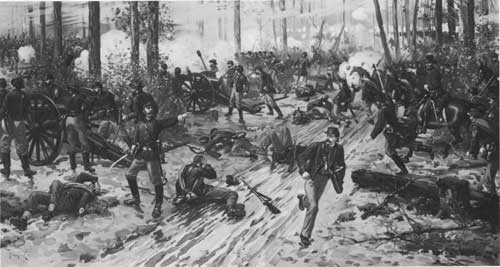
|
PERIOD PAINTING OF THE BATTLE OF SHILOH. (LC)
|
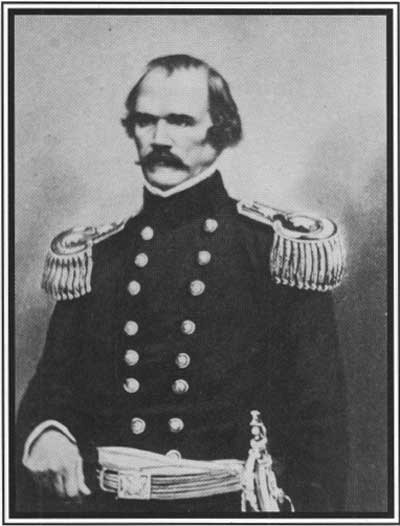
|
GENERAL ALBERT SIDNEY JOHNSTON (CWL)
|
If Union fortunes in the East looked grim as the end of the year
approached, they appeared a bit better in the West. In fact, the same
Grant who failed at Belmont started the year with a significant victory
in the taking of Forts Henry and Donelson, which guarded the lower
reaches of the Tennessee and Cumberland Rivers. These streams emptied
into the Ohio in Kentucky, but their upper reaches passed through all of
central Tennessee and northern Alabama. Yankee gunboats having access to
them could steam clear into the heart of the Confederacy and actually
get in the rear of Southern forces in Nashville and elsewhere. By taking
the two forts, Grant stood poised to do just that. As a result, the
Confederate commander in the region, Davis's bosom friend General Albert
Sidney Johnston, had no choice but to evacuate Tennessee to avoid being
cut off. He pulled into northern Mississippi, but then planned a
campaign to regain the territory he had lost. In late March he moved
north again and on April 6 almost completely surprised Grant and his
army camped near Pittsburg Landing, on the Tennessee. In the most
furious day's fighting yet seen in the West, Johnston struck all along
Grant's line. The struggle blazed in places with names like the Peach
Orchard, the Hornets' Nest, and beside Shiloh church. Johnston pressed
the Yankees almost back into the Tennessee itself. But then Johnston
fell from his saddle in a swoon and soon died. He bled to death from a
bullet wound in his leg that he foolishly ignored. Command shifted to
his second, Beauregard, who had been sent west chiefly because he and
Davis could not get along, and the new general almost immediately lost
his resolve. This, and large reinforcements during the night, saved
Grant, so that on April 7, he was ready to take the initiative, and by
the end of the day Beauregard was in retreat.
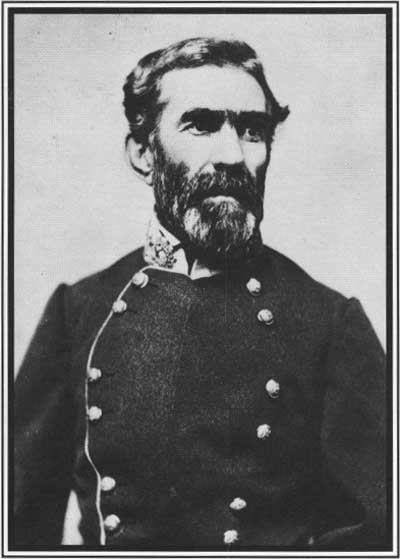
|
BRIGADIER GENERAL BRAXTON BRAGG (LC)
|
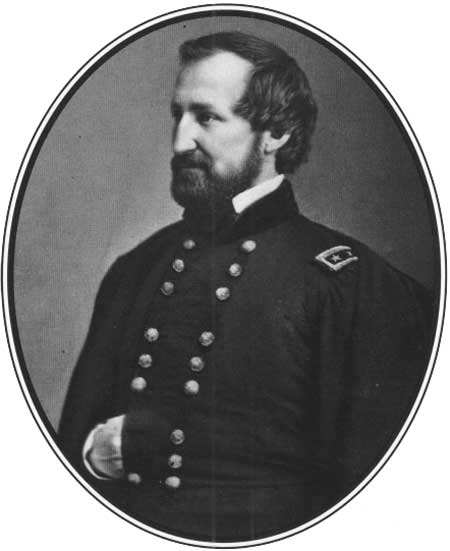
|
MAJOR GENERAL WILLIAM ROSECRANS (LC)
|
Hard on this success, Captain David G. Farragut's Union fleet steamed
up the Mississippi, past the forts guarding New Orleans, and on April 25
captured the city. This gave the Union control of the lower Mississippi
as well as the upper river, leaving the South only a hundred miles or so
of the stream between Mississippi and Arkansas and north Louisiana. Once
the Yankees gained complete mastery of the great river—if they
did—they would divide the Confederacy in two, isolating Texas,
Arkansas, and western Louisiana from the rest of the seceded states.
Slowly, just as in the taking of the Tennessee and Cumberland the
Yankees were carving the western Confederacy into slices by taking and
using its rivers.
The summer and fall of 1862 saw Grant and Farragut attempting to
close off the rest of the Mississippi, but the fortress city of
Vicksburg defeated their efforts. Meanwhile, Beauregard left his
command, and General Braxton Bragg took command of what was now termed
the Army of Tennessee. Moving in tandem with Lee's invasion of Maryland,
Bragg moved north in August hoping to retake middle Tennessee and push
into Kentucky, where he believed he would find large reinforcements
among Southern sympathizers. Instead, he found Kentuckians largely
indifferent to Confederate interests and more loyal to the Union than he
supposed. He got as far as the capital at Frankfort before a Union army
led by Don C. Buell began to threaten his line of retreat. Rebuffed by
Kentuckians, Bragg turned back, and at Perryville in October the two
armies fought an inconclusive engagement that still left Bragg with no
alternative but to continue his withdrawal.
In the end, Bragg pulled back to central Tennessee, while the Yankees
followed him as far as Nashville. For two months they refitted
themselves and planned their next move, and then a new commander,
William Rosecrans, led Buell's Army of the Cumberland south to attack
Bragg in December. Bragg met him in and around the small town of
Murfreesboro, along Stones River on December 31. For several hours the
armies hammered each other bloodily, and that evening Bragg wired
Richmond that he had won a great victory. The unending tale of defeat
for the Union seemed to roll onward without relief.
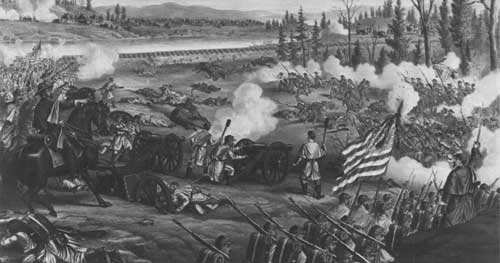
|
KURZ AND ALLISON PRINT FROM 1891 OF THE BATTLE OP STONES RIVER. (LC)
|
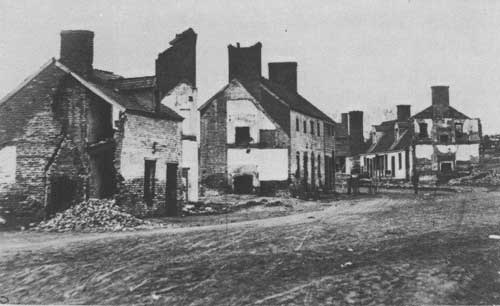
|
RUINS IN FREDERICKSBURG AFTER BOMBARDMENT IN DECEMBER 1862. (LC)
|
December 1862 was the high tide of the Confederacy. Never in all its
brief history did its prospects look brighter. Lee stopped Burnside at
Fredericksburg and was already showing himself to be the master of any
general the Yankees could send against him. Despite the loss of Albert
Sidney Johnston in the West and Bragg's repulse in Kentucky, the year
ended with Lee at the verge of sending Rosecrans back north in defeat.
Though much of the Mississippi fell to the enemy, still Vicksburg held,
as did Port Hudson a hundred miles south, keeping communications open
with the Trans-Mississippi Confederacy and its rich resources of men and
supplies. In Richmond Jefferson Davis had a government up and operating,
men still turned out with gusto to fill his regiments, and though
hard-pressed for weapons and money and every other article needled to
wage war, the Confederacy was still doing it thanks to the high resolve
of its people.
The infant nation had come a long way from the day back on February
4, 1861, when 47 delegates from South Carolina, Georgia, Florida,
Alabama, Mississippi, and Louisiana met in Montgomery, Alabama, to form
a defensive alliance. In four hectic days they formed a preliminary
constitution based on the old United States Constitution, adding an
article that specifically recognized the inalienable right to own
property in slaves. Then they chose a president. Everyone expected him
to be a Georgian because that state was a powerhouse of political
leaders, including Robert Toombs, Howell Cobb, and Alexander H.
Stephens. But Cobb had been too vacillating on Southern rights in the
past. Toombs could not hold his liquor and became embarrassingly drunk
just a night or two before the election. And Stephens took himself out
of the running, saying he had been too ardent a Unionist in the past for
Confederates to accept him now as their leader. Only on the last evening
before the election did the delegates settle on Jefferson Davis of
Mississippi, and on February 8 they elected him unanimously, making
Stephens his vice-president.
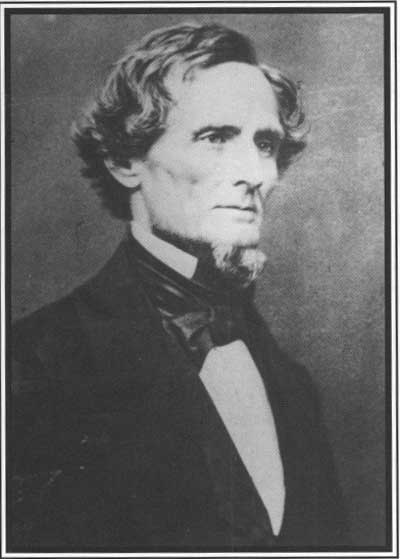
|
PRESIDENT OF THE CONFEDERACY JEFFERSON DAVIS (USAMHI)
|
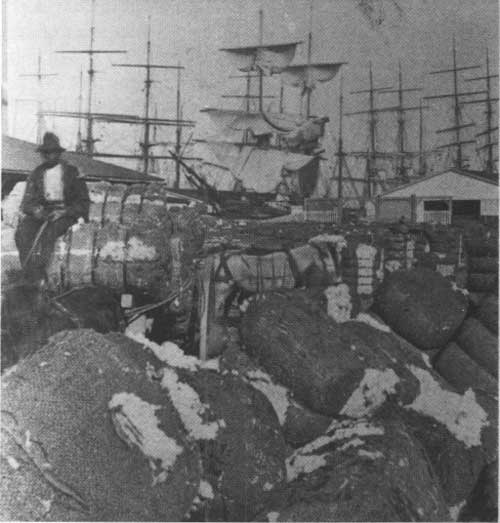
|
COTTON BALES ON THE DOCKS OF CHARLESTON HARBOR. (SOUTH CAROLINA
HISTORICAL SOCIETY)
|
The task before him dwarfed even the Herculean challenge facing
Lincoln. To get his government going, Davis almost literally stole much
of it from the Union. More than one of his cabinet secretaries persuaded
Southern sympathizers working in similar departments in Washington to
come south, bringing their staffs and even their office forms with them.
Secretary of the Treasury Christopher G. Memminger began announcing
subscription loans to raise money for the government, and in the end
Confederates contributed tens of millions in return for interest-bearing
bonds to be redeemed after a successful conclusion of the war. The Post
Office Department put itself in a position to be entirely
self-sustaining and eventually returned a profit by reducing services
and raising rates.
The founding fathers of the Confederacy saw themselves not as rebels,
but as reformers. They did not try to establish some radical new form of
government. They wanted the constitutional democracy they felt that had
had all along until the balance of power shifted to the North. They
wanted free trade with the world rather than a high tariff that
protected certain—Northern—industries. They opposed spending
the revenues raised from one state to make "internal improvements" or to
encourage an industry in another state. They wanted the Constitution
strictly obeyed in its literal intent and not "interpreted" to expand
the powers of central government. And they wanted the sovereignty of the
states recognized in all those matters in which they did not
specifically grant power to the nation. Most especially, of course, they
wanted protection for slavery.
Yet these men proved to be idealists in a way, too. Having seen all
of the sectional discord caused by party politics, especially when the
entirely sectional Republican Party rose to prominence, they dreamed of
a nation and a government without parties. In February 1861 they could
have such dreams, since in the excitement, euphoria, and fear of the
time, men of all stripes seemed united to the one goal of Southern
unification and defense. Unfortunately, it could not last. An opposition
immediately arose, headed by men whose disappointed ambitions for high
office made them instinctive enemies of Davis and his policy. Then there
were those who favored an aggressive prosecution of the war, while Davis
and the majority knew that the South was not equipped to do more than
maintain a spirited defensive. Soon the state governors got into the
fray, increasingly standing in Davis's way when he tried to get troops
and supplies from them. They would willingly turn over their regiments,
of course, but they refused to recognize the right of the government to
command them to do so. Within only a few months of the formation of the
Confederacy, the very doctrine of localism and states' rights that lay
at its core began working against it. By early 1862, these elements and
more, though they had no other issues to unite them, began to bond on
the single matter of hostility to Jefferson Davis. In time, the
partyless Confederacy had a second party after all, one with no name and
but a single credo, to thwart the president. Happily, they never managed
to do more than interfere. They never stopped any of his efforts, and
even in the Congress, which by 1864 had a sizable minority of anti-Davis
members, his majority remained safe enough that only one of his vetoes
was ever overridden, and that was one of minor importance. Battered,
abused, and maligned, still Jefferson Davis remained in command of the
Confederacy from beginning to end and left his personal stamp on its
history—for good and ill—even more than did Lincoln on the
Union.
|
|
